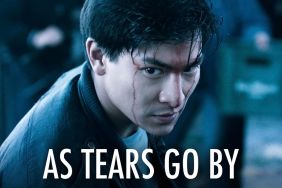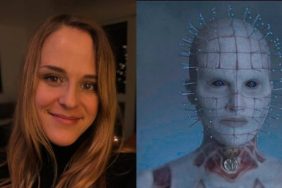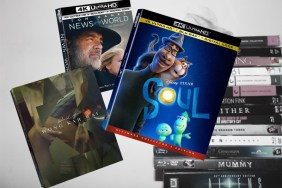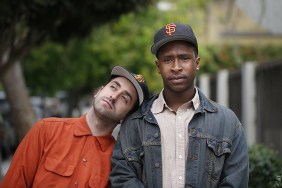Gong Li as Yibao Hu (“The Hand”)
Chang Chen as Xiao Zhang (“The Hand”)
Luk Auntie as Ying (“The Hand”)
Fung Tin as Master Jin (“The Hand”)
Robert Downey Jr. as Nick Penrose (“Equilibrium”)
Alan Arkin as Dr. Pearl (“Equilibrium”)
Ele Keats as Woman (“Equilibrium”)
Christopher Buchholz as Christopher (“Il Filo pericoloso delle cose”)
Regina Nemni as Cloe (“Il filo pericoloso delle cose”)
Luisa Ranieri as La ragazza (“Il filo pericoloso delle cose”)
Summary:
There’s nothing particularly erotic about this mixed bag of stories that never quite mesh. The Wong Kar Wai segment is the high point of this trilogy.
Story:
“The Hand” (directed by Wong Kar Wai) The relationship between a high priced courtesan (Gong Li) and her tailor (Chang Chen) is explored over the course of a number of years.
“Equilibrium” (directed by Steven Soderbergh) A salesman (Robert Downey Jr.) tries to tell an erotic dream to his psychiatrist (Alan Arkin) who seems to be distracted by something outside his window.
“The Dangerous Thread of Things” (directed by Michelangelo Antonioni) A quarreling couple break up, but then, the man has a one nighter with a mysterious woman he meets on the beach.
Analysis:
Three directors, three short films about eroticism and desire. That was the idea behind Eros, a rather disjointed omnibus put together by Italian director Michelangelo Antonioni and his producer Stéphane Tchal Gadjieff to showcase two “young directors” who were influenced by Antonioni’s work.
Of course, when this project began in 1995, neither Steven Soderbergh nor Wong Kar Wai were as well known as they are now. In those ten years, Soderbergh has become an Oscar winning Hollywood power player, who broke into the mainstream but continuously tries to get back to his indie roots; Wong Kar Wai has become Hong Kong’s artiest exports.
It’s the latter who starts off the trilogy of short films with a piece called “The Hand” about the unrequited romance between a tailor named Zhang and Miss Hua, the popular courtesan on whom he lavishes his most creative work. He meets Miss Hua while he is still a young apprentice, hearing her having sex with a client as he waits in the next room. When she sees that this excited the young teen, she humiliates him before quelling his erection with a hand job. This simple gesture is enough to earn Zhang’s loyalty for life, even when Miss Hua’s looks and beauty start to fail her. Eventually, she can’t afford to pay for Zhang’s beautiful clothes, and as she loses her sugar daddies, she takes to working the docks for money.
“The Hand” is clearly the stand-out of the three films, being a lovely fable that explores the true meanings of love and dedication. If it were longer than 43 minutes, it might make the movie worth the price of admission. Of course, Gong Li is magnificent as the manipulative courtesan, and she looks beautiful even as she ages over the course of the movie. Wong Kar Wai’s cinematographer Christopher Doyle uses many of the same visual tracks used for In the Mood for Love including the slow motion rain and people walking up and down stairs. Because of this, “The Hand” could be seen as a thematic or stylistic sequel to that film in the way it explores forbidden love.
Soderbergh’s “Equilibrium” is quite a departure in tone, being a rather amusing piece in the same way as Jim Jarmusch’s short films in Coffee and Cigarettes. It opens with a scene of a nude woman in color, which we learn later is a recurring dream of one Nick Primrose, played by Robert Downey Jr. As the film before cutting to a rather noir setting of a psychiatrist’s office where Robert Downey Jr. is telling his problems to Alan Arkin. The writing and performances by these two is the strong point of Soderbergh’s rather amusing piece, although it seems somewhat unsatisfying after the beauty of “The Hand.”
The first two segments have their moments of genius, but Antonioni’s own segment is so bad that you quickly forget about them. Not following the adage of saving the best for last, “The Dangerous Thread of Things” is so unbelievably pretentious that it quickly reminds you that this was the director whose career began with the overrated piece of trash, L’Aventurra.
This short film makes just about as much sense, as it follows the dealings of an American man with two Italian women, both of whom enjoy showing off their buxom bodies. (You’re not likely to realize he’s American unless you read the press notes.) Wong Kar Wai understands that one can have eroticism without showing nudity, but Antonioni just doesn’t quite get this. Never have naked Italian women seemed as unsexy as they do under Antonioni’s guidance, because nothing that comes out of the characters’ mouths is remotely interesting. Good luck finding any sort of plot behind the words.
For whatever reason, the language of choice for this piece is badly dubbed Italian, as if it were shot in a different language, dubbed into Italian, and then subtitled. After a short film in Chinese and another in English, there is little excuse for this type of sloppy incongruity. Either Antonioni was trying to create a throwback to 60s Italian cinema or he really just hasn’t improved as a director in the last forty years. To think that this piece would hold up to the works by the other directors is the height of arrogance from the Italian director.
The three parts are separated by an interstitial sequence of erotic artwork accompanied by a lovely song, which suffers the misnomer of being titled “Michelangelo Antonioni” after the project’s mastermind. Otherwise, the three parts don’t mesh together at all, either thematically or stylistically, which makes you wonder why bother to do an anthology like this at all.
The Bottom Line:
Two out of three isn’t quite good enough for a compilation film that seems to serve very little purpose except to stroke an Italian director’s sense of self-importance.
Eros opens in select cities today.










